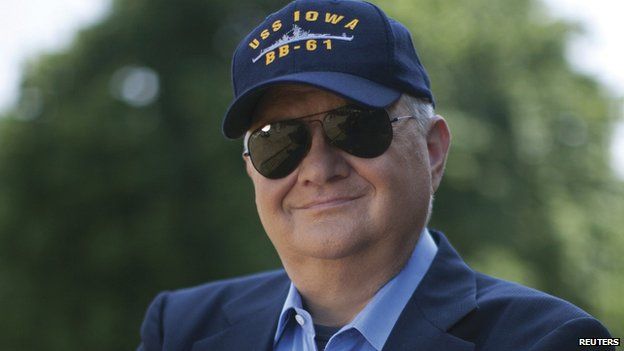Obituary: Tom Clancy
- Published

"Sometimes you have to put it on the line" - Tom Clancy
Tom Clancy, who has died aged 66, was one of the world's best-selling - and wealthiest - thriller writers.
His books - which included The Hunt for Red October and Patriot Games - inspired both blockbuster films and best-selling video games.
The American author's other bestsellers included Red Storm Rising, Clear and Present Danger, The Sum of All Fears and Without Remorse.
Clancy once said his dream had been to publish a book so he could be "immortal" in the Library of Congress catalogue.
Born in Baltimore on 12 April 1947, Clancy studied physics at college but switched to English, saying later that he wasn't clever enough for the challenges of science.
His novels, however, were rich with authoritative scientific and technical detail, something Clancy put down to his enthusiasm for reading military journals.
Clancy joined the US Army Reserve at university, but poor eyesight thwarted his ambition to serve in the Vietnam war. After graduation in 1969, he married and joined his wife's family's insurance business.
Writing in his spare time as an insurance salesman, Clancy had an immediate success in 1984 with his first novel The Hunt for Red October. He sold the manuscript to the Naval Institute Press, which had never ventured into original fiction.
President Ronald Reagan, who received the book as a Christmas present, said it was his favourite thriller, an endorsement that Clancy said helped put him on the New York Times best-seller list.
Red October told the Cold War story of a Soviet navy captain who decides to defect to the United States with his nuclear submarine.
It was made into an Oscar-winning film in 1990, starring Alec Baldwin as Jack Ryan - a recurring hero of Clancy's - and Sir Sean Connery as Soviet submarine captain Marko Ramius.
Clancy followed it up with Red Storm Rising and Patriot Games, which told of a fictional IRA splinter group that plots to kidnap the Prince and Princess of Wales.
The latter title became the second Jack Ryan novel to be filmed, this time with Harrison Ford as the CIA analyst who, in Clancy's later works, was eventually elevated to President of the United States.
Clancy's thrillers - he usually turned out one a year - made him one of the wealthiest writers in the world, with annual earnings of about $30m (£19m) in the mid-1990s.
In a 2007 interview, external with US TV network AMC, Clancy attributed his success to dogged persistence and deep research.
"You learn to write the same way you learn to play golf," he said. "You do it, and keep doing it until you get it right.
"A lot of people think something mystical happens to you, that maybe the muse kisses you on the ear. But writing isn't divinely inspired - it's hard work."
"I don't write about super-heroes," he told Verbosity, external magazine. "I want my protagonists to be recognisably human, with real human concerns.
"Some of my characters are based on real people. One's even based on me."
Clancy also ventured into the world of video gaming, spawning best-selling titles that included the Ghost Recon and Splinter Cell series.
"What happened to me was pure dumb luck," Clancy told AMC TV, external. "I'm not the new [Ernest] Hemingway.
"Of course, fortune does favour the brave. In battle, you forgive a man anything except an unwillingness to take risks. Sometimes you have to put it on the line.
"What I did was take time away from how I earned my living. My wife gave me hell - 'Why are you doing this?' - but she doesn't complain anymore.
"I wanted to see my name on the cover of a book. If your name is in the Library of Congress, you're immortal."
The Hunt for Red October was filmed in 1990 with Sir Sean Connery, Alec Baldwin (as Jack Ryan) and Scott Glenn
Despite several of his books making it to the big screen, Clancy admitted to having a sometimes rocky relationship with Hollywood.
"Books and movies are different art forms with different rules. And because of that, they never translate exactly," he said in an interview on CNN.
"Their view of my books frequently takes different paths from the way I think about it. But that's to be expected.
"They pay me money and buy the book. When they buy the book, they buy rights to play with the plot.
"The only person who has artistic control is the director, and 'director' is how you spell God in Hollywood."
- Published2 October 2013
- Published2 October 2013
- Published2 October 2013